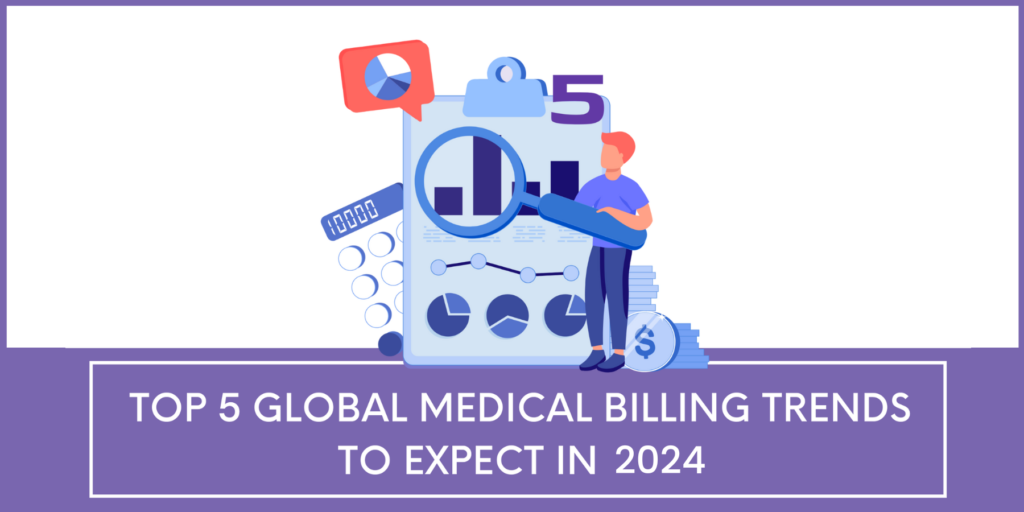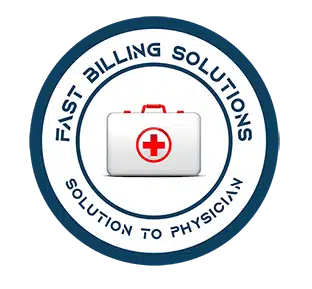
Embark on a journey of innovation and excellence with the insights into the Top 5 Global Trends to Follow in Medical Billing in 2024. In the intricate landscape of healthcare administration, medical billing stands as a linchpin that ensures the financial health of medical practices. As we stride into 2024, the realm of medical billing is undergoing dynamic shifts, driven by technological advancements, regulatory changes, and evolving patient expectations. Navigating these changes is crucial for medical professionals, billing specialists, and patients alike. In this comprehensive guide, we explore the Top 5 Global Trends to Follow in Medical Billing in 2024. From cutting-edge technologies to shifting cost dynamics, we uncover the trends that are shaping the future of medical billing.
1. Embracing Technological Advancements for Enhanced Efficiency
In a world where digital transformation is ubiquitous, the realm of medical billing is no exception. Medical Billing Companies in New York and across the globe are increasingly harnessing advanced technologies to streamline processes, minimize errors, and optimize revenue cycles. From AI-powered coding assistance to blockchain-enabled data security, technology is revolutionizing the way medical billing operates.
2. The Rise of Telehealth and Remote Billing
The emergence of telehealth services has redefined the boundaries of medical care. As medical billing in New York and worldwide adapts to this new landscape, remote billing is gaining prominence. Remote billing specialists are becoming vital assets, ensuring accurate coding and timely claim submissions for virtual medical services.
3. Navigating the Complexities of Medical Billing Modifiers
The medical billing modifier, a critical component of the billing process, warrants attention. A medical billing modifier is a code used to provide additional information about a service, procedure, or supply. In 2024, understanding and correctly applying these modifiers will remain a crucial aspect of medical billing to ensure accurate reimbursement.
4. Unveiling Medical Cost Trends in 2024
The cost of medical care is an ever-evolving landscape. Understanding the medical cost trends in 2024 is essential for both medical professionals and patients. As the healthcare industry adapts to new technologies and regulations, keeping a pulse on cost trends helps medical billing companies anticipate financial shifts and provide transparent billing practices.
5. The Future of Medical Billing Costs
A pertinent question looms: Will medical billing costs rise in the future? While the answer is multifaceted, one thing is certain – the landscape of medical billing is evolving. As technology integration and regulatory changes continue to shape the industry, medical billing costs may be influenced by factors such as increased efficiency or the complexity of new billing requirements. Staying informed and proactive is key to effectively managing these potential cost changes.
Navigating the Path Forward
In the fast-paced world of healthcare administration, staying abreast of professional medical billing trends is essential for a seamless financial journey. Whether you’re a medical professional seeking to optimize revenue or a patient navigating the intricacies of medical billing, understanding these trends equips you with the knowledge needed to navigate the evolving landscape. As medical billing centers embrace cutting-edge technologies and adapt to changing regulations, the future of medical billing holds promise for enhanced efficiency, accuracy, and patient-centricity. Stay ahead of the curve and navigate the evolving landscape of healthcare finance with the guidance of the “Top 5 Global Trends to Follow in Medical Billing in 2024.
In conclusion, the world of medical billing is on the brink of transformative changes in 2024. From technological innovations to remote billing solutions, the landscape is evolving rapidly. Staying informed about medical billing outsourcing trends, mastering coding modifiers, and anticipating cost dynamics empower both medical professionals and patients to navigate this landscape with confidence. As we traverse this dynamic terrain, the fusion of technology, expertise, and patient-centered care emerges as the cornerstone of the future of medical billing.
Remember, in the realm of medical billing, knowledge is power, and being proactive in embracing these trends is the key to unlocking a more efficient and effective future.
The most asked question about medical billing and its future….

1. What is Billing in Medical Term?
In the medical context, billing refers to the process of generating and submitting claims for healthcare services provided to patients. It is a crucial aspect of the revenue cycle management within healthcare practices and facilities. Billing encompasses the documentation, coding, and submission of accurate and detailed information about medical procedures, treatments, and services rendered to patients.
The medical billing process involves several key steps:
- Documentation: Healthcare providers create detailed records of the services they provide, including diagnoses, procedures, and any relevant medical codes.
- Coding: Medical coders translate the documented services into standardized codes, such as Current Procedural Terminology (CPT) codes and International Classification of Diseases (ICD) codes.
- Claim Submission: The coded information is used to prepare and submit claims to insurance companies, government programs (e.g., Medicare, Medicaid), or patients for reimbursement.
- Insurance Processing: Insurance companies review the submitted claims, verify coverage, and determine the amount of reimbursement based on the patient’s insurance plan.
- Patient Billing: Patients may receive statements indicating their portion of the bill, which can include deductibles, copayments, and any services not covered by insurance.
- Payment Collection: The billing process concludes with the collection of payments from insurance companies and patients.
Effective billing practices are essential for healthcare providers to receive timely and accurate reimbursement for the services they provide while ensuring transparent communication with patients about their financial responsibilities.
2. What is a Medical Billing Modifier?
A medical billing modifier is a two-character code that provides additional information about a service, procedure, or supply that has been provided. It is used to indicate specific circumstances that may affect the way a service is billed or reimbursed. Modifiers are crucial in clarifying any unique aspects of a service that could impact its coverage, payment, or medical necessity.
For example, a modifier may be used to indicate that a procedure was performed on multiple body parts, that a service was provided by a different healthcare provider, or that a service was rendered under unusual circumstances.
Modifiers are important for accurate billing and claims processing. They ensure that insurance companies and payers have all the necessary information to understand the context of a service and make appropriate reimbursement decisions.
3. What are the Medical Cost Trends in 2024?
The landscape of medical costs is subject to various trends that can impact both healthcare providers and patients. While specific predictions for 2024 may vary, several overarching trends are likely to shape medical costs:
- Technological Advancements: The integration of advanced technologies, such as telehealth and digital health solutions, may lead to changes in the way healthcare services are delivered and billed.
- Value-Based Care: The shift towards value-based care models, where reimbursement is tied to patient outcomes, could influence medical costs as providers focus on delivering high-quality care.
- Regulatory Changes: Changes in healthcare regulations and policies can impact billing practices and reimbursement rates, potentially affecting medical costs.
- Rising Drug Costs: The cost of pharmaceuticals can contribute significantly to overall medical costs, and fluctuations in drug prices may influence healthcare expenditures.
- Patient-Centric Models: Increasing patient engagement and empowerment could lead to changes in how patients make healthcare decisions and navigate costs.
It’s important to note that medical cost trends can vary by region, specialty, and other factors. Staying informed about these trends is crucial for healthcare providers, insurers, policymakers, and patients to make informed decisions and strategies.
4. Will Medical Billing Costs Rise in the Future?
The future trajectory of medical billing costs is influenced by a complex interplay of factors, including technological advancements, regulatory changes, healthcare policies, and economic conditions. While no prediction can be definitive, several factors may contribute to potential changes in medical billing costs:
- Technological Innovation: Advances in medical billing technology, such as automation and AI-driven solutions, could lead to increased efficiency and potentially mitigate certain costs.
- Regulatory and Compliance Changes: Changes in healthcare regulations and compliance requirements can impact the complexity and cost of billing processes.
- Value-Based Care: The transition to value-based care models may influence billing practices and the way services are reimbursed, potentially affecting billing costs.
- Administrative Efficiency: Improvements in administrative processes, such as streamlined claim submissions and reduced errors, could influence the overall cost of medical billing.
- Industry Competition: The competitive landscape among medical billing companies and healthcare providers may impact pricing and billing service costs.
While some factors may contribute to potential cost reductions, others could lead to increased costs. The direction of medical billing costs in the future will depend on how these factors intersect and evolve. Staying informed about industry trends, embracing efficient billing practices, and leveraging technology can play a role in managing and potentially optimizing medical billing costs.
In conclusion, understanding billing processes, modifiers, cost trends, and potential cost changes is vital for both healthcare professionals and patients. The world of medical billing is intricately connected to the broader healthcare landscape, and staying informed empowers stakeholders to make informed decisions and navigate the complex terrain of healthcare administration.
Fast Billing Solutions a Medical Billing Company in New York has been a pioneer organization for medical billing & coding in US. We have been in medical billing & coding industry for over a decade now and provide highly experienced medical biller that help your healthcare practice to gain a competitive edge. Boost Your Medical Revenue - Streamline Billing Process for Optimal Results! Maximize your practice's earning potential with our cutting-edge Medical Billing solution. Efficiently manage claims, reduce errors, and accelerate reimbursements. Start increasing your revenue today!Click Here to Get Free Demo of Your Practice!